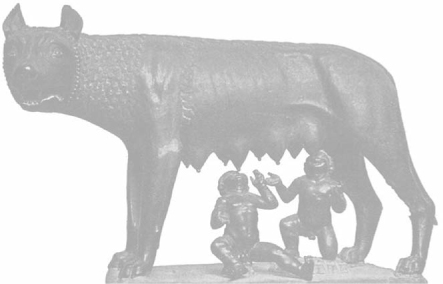Roman MythologyWhat Do We Mean By a Roman and Roman Mythology? |
Is it true, as commonly assumed, that Roman mythology was simply Greek mythology translated into Latin? |
Today a Roman is simply someone who lives in Rome. To be a Roman once meant to be a citizen of a city-state and republic and then a vast empire, the capital of which was the city of Rome. The language of Rome was Latin, the ancestor of the modern Romance languages. When we speak of Roman mythology, we refer to the mythology of Rome in its various geopolitical stages before the establishment there of Christianity as the dominant religion.
Greek mythology was only one of many influences on Roman mythology. The people in the eighth century B.C.E. who inhabited the village, or urb (urban, suburban), on the Tiber River that would become Rome spoke an Italic language as did other inhabitants of Latium, including, for instance, several Latin tribes and the Sabines. The source of their language and their patriarchal and warlike culture was that of the Indo-Europeans who migrated into Italy sometime in the second millennium B.C.E. The early Romans and other Latins interrelated and often fought with the Etruscans in the north and the Greek colonies in the south. These interrelationships had definite influence on the development of Roman religious and mythological traditions. The Etruscans controlled Rome from 750 B.C.E. until Rome gained independence and founded a Republic with a senate in 509 B.C.E. Two hundred fifty years of Etruscan dominance was bound to have a significant effect on Roman religion and mythology. Many years of trade and eventual Roman control of the Greeks in the south in the third century B.C.E. resulted in direct Greek mythological influence as well.
A de facto Roman Empire was established in the third century B.C.E. with the conquest of Greece itself and of Carthage by the end of the Punic Wars. The Republic essentially came to an end when Julius Caesar established an effective dictatorship in 40 B.C.E. After the caesar’s assassination in 44 B.C.E., a long civil war between Marcus Junius Brutus and Gaius Cassius Longinus on one side and Marcus Antonius and Octavian on the other, and later between Marcus Antonius and Octavian (all of these made famous by Shakespeare in Julius Caesar and Antony and Cleopatra), resulted in Octavian’s victory in 31 B.C.E. and the official establishment of the Roman Empire under Octavian, now Augustus Caesar in 27 B.C.E.
With the gradual expansion of the Roman Empire under Augustus and later emperors, the Romans interacted with the cultures of the peoples under their control and these interactions resulted in the absorption of various mythological traditions from as far away as Persia (Iran) and Anatolia (Turkey). When Christianity became dominant in Rome in the fourth century C.E., Rome adopted the narratives and rituals of that tradition and became the center of what would become Roman Catholicism.

